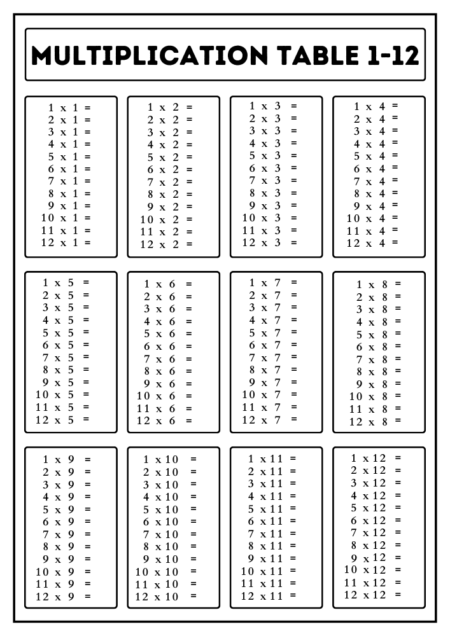Multiplication Tables Worksheets
Multiplication tables, also known as times tables, are a fundamental building block in mathematics education. They serve as the foundation for more complex mathematical concepts such as division, fractions, algebra, and problem-solving skills. To master these tables, students often rely on multiplication tables worksheets. These worksheets are a versatile tool that can help students of varying ages and abilities to solidify their understanding of multiplication through repetitive practice, guided learning, and fun activities.
The Importance of Multiplication Tables
Before diving into the specifics of worksheets, it’s crucial to understand why mastering multiplication tables is so important:
- Foundation for Advanced Math: Multiplication is a core mathematical operation that is essential for understanding more advanced topics such as fractions, ratios, algebra, and geometry.
- Problem-Solving Skills: Proficiency in multiplication aids in quicker problem-solving, as it reduces the cognitive load when tackling more complex problems.
- Confidence Building: Mastery of multiplication tables boosts students’ confidence in math, making them more likely to engage with and enjoy the subject.
- Practical Life Skills: Multiplication is not just an academic requirement; it’s a practical life skill used in everyday tasks such as budgeting, shopping, and cooking.
Types of Multiplication Tables Worksheets
Multiplication tables worksheets come in various formats, each designed to cater to different learning styles and objectives. Here are some common types:
- Basic Multiplication Tables Worksheets:
- These worksheets focus on simple multiplication facts, typically from 1×1 to 12×12. They are designed for beginners and are often used to introduce students to multiplication.
- Timed Drills:
- Timed multiplication drills are worksheets where students must complete as many multiplication problems as possible within a set time limit. This type of worksheet helps improve speed and accuracy.
- Multiplication by Number:
- These worksheets focus on multiplying by a specific number. For example, a worksheet might cover only the 7 times table, helping students to concentrate on one set of facts at a time.
- Fill-in-the-Blank:
- Fill-in-the-blank worksheets provide a multiplication problem with one part missing. Students must figure out the missing number, which reinforces their understanding of multiplication concepts.
- Multiplication Puzzles and Games:
- To make learning multiplication more engaging, some worksheets incorporate puzzles, games, and riddles. These might include crosswords, word searches, or matching games that revolve around multiplication facts.
- Word Problems:
- Multiplication word problems require students to apply their multiplication skills in real-world scenarios. These worksheets help students to see the practical applications of multiplication and improve their problem-solving abilities.
- Advanced Multiplication Worksheets:
- These worksheets are designed for students who have mastered the basics and are ready to move on to multi-digit multiplication, long multiplication, or multiplying fractions and decimals.
Benefits of Using Multiplication Tables Worksheets
Using multiplication tables worksheets offers several key benefits to students:
- Reinforcement of Concepts:
- Repetition is a powerful tool in learning. By repeatedly practicing multiplication through worksheets, students reinforce their understanding and commit these facts to long-term memory.
- Individualized Learning:
- Worksheets can be tailored to suit the learning pace of each student. Teachers can provide easier worksheets for those struggling with the basics and more challenging ones for advanced students.
- Immediate Feedback:
- Worksheets, especially those used in conjunction with answer keys, provide immediate feedback to students. This allows them to identify and correct mistakes promptly, which is essential for effective learning.
- Versatility:
- Multiplication tables worksheets can be used in a variety of settings—classrooms, homework assignments, or extra practice at home. They are also adaptable for group work or independent study.
- Motivation and Engagement:
- Creative and interactive worksheets, such as puzzles and games, make learning multiplication more enjoyable. This can increase student engagement and motivation.
- Tracking Progress:
- Worksheets offer a tangible way to track a student’s progress over time. Teachers and parents can use completed worksheets to assess a child’s mastery of multiplication and identify areas needing more practice.
Strategies for Effective Use of Worksheets
To maximize the effectiveness of multiplication tables worksheets, consider the following strategies:
- Gradual Progression:
- Start with basic multiplication facts and gradually introduce more challenging worksheets. This helps build confidence and ensures a solid understanding before moving on to complex problems.
- Incorporate Timed Drills:
- Regular timed drills can help improve speed and accuracy, but it’s important to balance these with non-timed worksheets to avoid unnecessary pressure.
- Use Varied Formats:
- Rotate between different types of worksheets (e.g., basic facts, word problems, games) to keep learning fresh and cater to different learning styles.
- Encourage Self-Correction:
- Provide students with answer keys so they can check their own work. This promotes independence and self-assessment skills.
- Integrate Real-World Applications:
- Use word problems that relate to real-life scenarios to show students the practical use of multiplication.
- Personalize Learning:
- Tailor worksheets to address specific areas where a student may be struggling. Personalization can make learning more effective and meaningful.
- Celebrate Success:
- Acknowledge progress and success to build a positive learning environment. This could be as simple as a sticker on a well-done worksheet or verbal praise.
Multiplication tables worksheets are an invaluable resource in math education. They provide the repetition necessary for mastering multiplication while offering a variety of formats to keep learning engaging. When used effectively, these worksheets can significantly enhance a student’s mathematical abilities, setting them up for success in both academic and real-life situations.
By understanding the different types of worksheets available and implementing strategies to use them effectively, educators and parents can support students in developing a strong foundation in multiplication—a skill that will serve them well throughout their lives.

